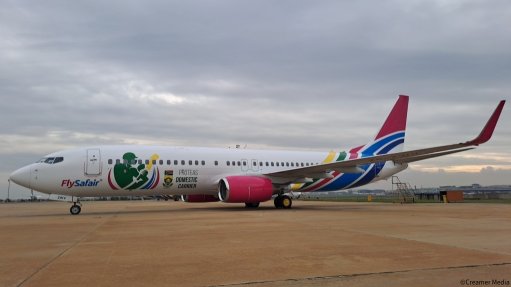Green Connection speaks out against Wild Coast seismic survey by oil and gas multinational
The Department of Forestry, Fisheries and the Environment (DFFE) on November 22 said Mineral Resources and Energy Minister Gwede Mantashe was responsible for the administration of the Mineral and Petroleum Resources Development Act (MPRDA) and that Forestry, Fisheries and the Environment Minister Barbara Creecy was, therefore, not mandated to consider an application or to make a decision on the authorisation of a seismic survey being undertaken by oil and gas multinational Shell.
"The impact of the seismic survey to be undertaken by Shell and [impact investment organisation] Impact Africa has been authorised under the MRPDA, which, under Section 39 (2) of the MPRDA requires the submission of an environmental management plan, which is to assess and evaluate the environmental impacts of the activity.
"Since the coming into effect of the One Environment System on December 8, 2014, the application process for the seismic surveys was finalised. All decisions made under the MPRDA at the time remain valid and binding until set aside by a court of law," the DFFE said in a statement.
Environmental protection and small-scale fishing lobby organisation The Green Connection strategic lead Liziwe McDaid said Shell has used a legal loophole, as no environmental impact assessment was required in 2013 and this authorisation was being used to justify its actions in 2021.
“No meaningful public participation is needed, yet the seismic survey will have an impact on marine life and, subsequently, could impact the lives and livelihoods of the communities who depend on the ocean’s resources. How can our government allow a corporation to do this without any accountability?” she questioned.
“As per [Environmental Management Programme (EMPr)] requirements, a 30-day seismic survey notification was distributed to the public. SLR Consulting was appointed by Shell to distribute this notification on its behalf. All comments received will be collated and shared with [Shell],” The Green Connection stated, quoting a response by environmental consultant SLR Consulting.
The Green Connection wrote to SLR Consulting on November 10, asking for all the relevant permits, but SLR has referred the letter to Shell and The Green Connection was still waiting for a response, McDaid said.
“On World Fisheries Day, we have a strong message for the Shell Corporation – stop messing up our planet. By causing harm to the ocean, the knock-on effect is that the livelihoods of our small-scale fishing communities could be affected.
“The time has come to completely change your business model, because fossil fuels are the past and only enriching a few, while climate change is real and harming nature as well as the thousands of people who depend on a healthy environment for their livelihoods,” she said.
Nearly 200 concerned environmental defenders arrived at the Cape Town Waterfront on November 21 to protest against Shell’s seismic testing vessel Amazon Warrior, as it made its way into Cape Town harbour. The Amazon Warrior was commissioned by Shell to conduct seismic testing off the Wild Coast, in the Eastern Cape, stretching from the Kei river to the uMtamvuna river on the border of KwaZulu-Natal.
The vessel will conduct seismic surveys for an estimated five months.
The Green Connection is particularly concerned about the timing of this seismic survey phase, which is understood to still fall within the migration season for hump-backed whales and warned it could also endanger juvenile turtles coming down the coast in the Agulhas current into the survey area over the five-month period.
Shell’s own 2013 EMPr states that it should try to “avoid surveying during December when humpback whales may still be moving through the area on their return migrations”, McDaid pointed out.
SHELL'S RESPONSE
On November 23, Shell Downstream South Africa sent responses to questions from Engineering News about their seismic survey practices.
“Shell has long experience in collecting seismic data and the welfare of wildlife is a major factor in the stringent controls we use, strictly following the international guidelines of the Joint Nature Conservation Committee. These are based on decades of global scientific research. We take great care to prevent or minimise impacts on fish, marine mammals and other wildlife,” Shell Downstream South Africa said.
No seismic operations will take place in marine protected areas (MPAs). There is also a buffer area around MPAs where no seismic activities may take place, it added.
“Mitigations in this survey will include an exclusion zone of 500 m around the sound source that is continually monitored 24 hours a day by independent marine mammal observers on board, who conduct visual inspections during daylight hours to maintain the exclusion zone.”
Further, passive acoustic monitoring (PAM) will be done 24 hours a day during the survey to account for any deep-diving species in the area, as well as to provide information during hours of darkness and/or poor visibility.
The exclusion zone of 500 m around the sound source means that no animals will come into the near vicinity of the sound source. If any animal enters the exclusion zone of 500 m, operations are immediately shut down. A pre-watch must be conducted for at least 60 minutes to confirm there is no marine animal within the exclusion zone before operations can commence.
Further, on start-up, the sound is increased slowly to allow any animals in the surrounding area to gradually move away from the sound source, Shell Downstream South Africa said.
ENVIRONMENTAL MANAGEMENT PLAN
Meanwhile, these marine protection practices during seismic surveying align with the findings and recommendations of an unrelated 'Environmental Management Plan for a reconnaissance permit to undertake a speculative two-dimensional (2D) seismic survey in the Durban Basin off the East Coast of South Africa,' prepared by local environmental consultancy CCA Environmental for State-owned petroleum exploration Petroleum Agency South Africa (Pasa) in October 2013.
This 2013 environmental management plan (EMP) said that, in summary, the majority of the impacts associated with the seismic survey would be of short-term duration and limited to the immediate survey area. As a result, the majority of the impacts associated with the seismic survey are considered to be of very low to low significance after mitigation.
“The two key issues identified in this study relate to the potential impact on turtles and marine mammals, including physiological injury and behavioural avoidance, as a result of seismic noise; and the potential impact on the fishing industry, including vessel interaction, disruption to fishing operations and reduced catch, owing to the presence of the survey vessel, potential fish avoidance of the survey area and changes in feeding behaviour,” the report's authors said.
“Although most of the impacts on turtles and cetaceans [whales, dolphins and porpoises] are assessed to have very low to low significance with mitigation, the impact could be of much higher significance owing to the limited understanding of how short-term effects of seismic surveys relate to longer term impacts,” the report highlighted.
“For example, if a sound source displaces a species from an important feeding or breeding area for a prolonged period, impacts at the population level could be more significant. In order to mitigate the potential impact on turtles and cetaceans it is recommended that the proposed seismic survey be planned to avoid key turtle nesting periods, from October to March, with peak nesting during December and January, and cetacean migration and breeding periods from the beginning of June to end of November.
“Thus, from an ecological perspective, the proposed survey should be undertaken from mid-March to the end of May. However, should the applicant require a longer survey period, that is early March to mid-June, the survey programme should be scheduled to avoid inshore areas during early March and the southern area during June, the CCA Environmental 2013 EMP said.
Article Enquiry
Email Article
Save Article
Feedback
To advertise email advertising@creamermedia.co.za or click here
Comments
Press Office
Announcements
What's On
Subscribe to improve your user experience...
Option 1 (equivalent of R125 a month):
Receive a weekly copy of Creamer Media's Engineering News & Mining Weekly magazine
(print copy for those in South Africa and e-magazine for those outside of South Africa)
Receive daily email newsletters
Access to full search results
Access archive of magazine back copies
Access to Projects in Progress
Access to ONE Research Report of your choice in PDF format
Option 2 (equivalent of R375 a month):
All benefits from Option 1
PLUS
Access to Creamer Media's Research Channel Africa for ALL Research Reports, in PDF format, on various industrial and mining sectors
including Electricity; Water; Energy Transition; Hydrogen; Roads, Rail and Ports; Coal; Gold; Platinum; Battery Metals; etc.
Already a subscriber?
Forgotten your password?
Receive weekly copy of Creamer Media's Engineering News & Mining Weekly magazine (print copy for those in South Africa and e-magazine for those outside of South Africa)
➕
Recieve daily email newsletters
➕
Access to full search results
➕
Access archive of magazine back copies
➕
Access to Projects in Progress
➕
Access to ONE Research Report of your choice in PDF format
RESEARCH CHANNEL AFRICA
R4500 (equivalent of R375 a month)
SUBSCRIBEAll benefits from Option 1
➕
Access to Creamer Media's Research Channel Africa for ALL Research Reports on various industrial and mining sectors, in PDF format, including on:
Electricity
➕
Water
➕
Energy Transition
➕
Hydrogen
➕
Roads, Rail and Ports
➕
Coal
➕
Gold
➕
Platinum
➕
Battery Metals
➕
etc.
Receive all benefits from Option 1 or Option 2 delivered to numerous people at your company
➕
Multiple User names and Passwords for simultaneous log-ins
➕
Intranet integration access to all in your organisation


















